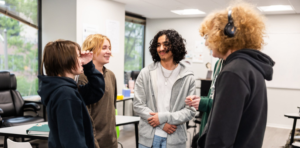You’re not SOL at The Sycamore School
It’s SOL testing season, a time where teachers are stressed out and kids are wishing school was done for the year.
What are SOLs?
SOLs are the Virginia Standards of Learning. They describe the commonwealth’s expectations for student learning and achievement in grades K-12 in English, mathematics, science, history/social science, technology, the fine arts, foreign language, health and physical education, and driver education (Virginia Department of Education, 2017). The SOLs include curriculum frameworks, scope and sequence guides and standardized tests that determine minimum competency in a subject area. Unfortunately, the SOL testing pass rates impact school ratings, school funding and are one of the criteria for obtaining a Virginia high school diploma.
The Negative Impact
Virginia public schools are increasingly resorting to scripted teaching, requiring teachers to teach in a prescribed manner, with identical scope and sequence. In short, teachers are not trusted to independently teach and assess their students but are forced to teach to a test. Teachers’ creativity and opportunities for differentiation are severely limited.
What’s the Alternative to ‘Teaching to the Test’?
At The Sycamore School, we focus on what we believe are the most important elements of education. We teach kids how to think, how to learn and how to take ownership of their learning. We do this by starting with the why, so students know why they’re learning something. Our teaching approach embraces Problem-Based Learning (PBL) where students participate in active learning centered around investigation and resolution of messy, real-world problems (Learning Theories, 2014) PBL is a student-centered approach in which students learn about a subject by working in groups to solve an open-ended problem (Cornell University Center for Teaching Excellence, 2016). Learning focuses on the real-world application of skills. Students are engaged, challenged and learn by doing. Teachers serve as guides and facilitators. Different perspectives can lead to various solutions for the same problem. PBL promotes effective communication, creative problem-solving, critical thinking, collaboration, and self-directed learning. Benefits include increased motivation, comprehension, retention, and development of life-long learning skills.
PBL learning is exemplified at our Rube Goldberg Machine Camp this August. Campers are encouraged to collaborate and problem solve, to try different ideas, knowing it will take several tries before they’re successful.
Posted in:

